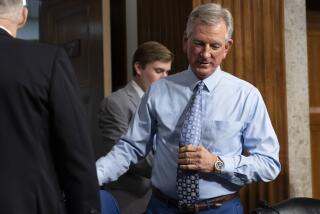China Completes Its Biggest Shake-Up of Military Chiefs : Reshuffle: Deng reportedly launched the changes to curb the power of President Yang and his half-brother.
- Share via
BEIJING — China has completed the most sweeping reshuffle of high-ranking military officers in the 43-year history of Communist rule, a Beijing-controlled Hong Kong newspaper said Tuesday.
The shake-up was carried out “to fully ensure that the military is one with the party Central Committee in ideology, actions and politics,” according to the report in the Wen Wei Po, a newspaper often used by the Beijing government to release sensitive news before it is officially announced by China’s domestic press.
The reshuffle also will contribute to modernization of the country’s 3 million-strong army, it said.
The report comes against a background of rumors that proteges of Gen. Yang Baibing, ambitious younger half-brother of Chinese President Yang Shangkun, have been retired or demoted.
Some reports in independent Hong Kong media have described the reshuffle as a purge of Gen. Yang’s supporters. They have said it was launched by senior leader Deng Xiaoping out of concern that the Yang brothers were accumulating too much power.
The Wen Wei Po report did not mention the Yangs. Analysts are divided over whether Deng has, in fact, turned against one or both of the Yang brothers. But it is clear that their influence over the military is fading.
Yang Baibing ranked fourth in China’s military hierarchy, as secretary general of the party’s Central Military Commission and chief of the army’s General Political Department, until a Communist Party congress this fall. There, he was promoted to the 20-member Politburo but lost his military posts. At the same time, President Yang, 85, in an apparent step toward retirement, gave up his position as first vice chairman of the Central Military Commission.
The most important military promotion at the party congress went to Gen. Liu Huaqing, who was elevated to the seven-member Politburo Standing Committee. Liu is an advocate of technical modernization and military professionalism within the armed forces.
Communist Party General Secretary Jiang Zemin, who heads the Central Military Commission despite lacking longstanding military ties, is also viewed as an advocate of military modernization. Jiang, supported by Deng, personally supervised the reshuffle, Wen Wei Po said. Liu presumably would also have played a key role. This should strengthen their personal power bases, as well as advance their ideas for the armed forces’ future.
The reshuffle, which began in mid-October and was completed by the end of November, affected commanders and political commissars at the country’s seven military regions and heads of central command departments, the report said.
“This reshuffle of military leadership will have deep and far-reaching influence on carrying out the line of the (recent) 14th Party Congress within the army, on persisting in the absolute leadership of the party over the army and on building up the army,” Wen Wei Po said.
Both Yang brothers were deeply involved in the 1989 crackdown on China’s pro-democracy movement. President Yang, along with Deng and other elderly leaders, played a key role in ordering use of the army to end the Tian An Men Square protests. After the June 4 massacre, Yang Baibing, in his position as the army’s top ideologue, was one of the most prominent propagandists justifying the army’s actions.
While the reshuffle in no way constitutes a repudiation of the Tian An Men crackdown, it could have the effect of helping to distance the next generation of army leadership from the taint of the 1989 bloodshed.
More to Read
Sign up for Essential California
The most important California stories and recommendations in your inbox every morning.
You may occasionally receive promotional content from the Los Angeles Times.










